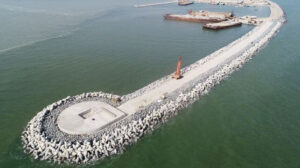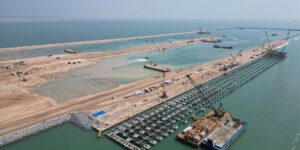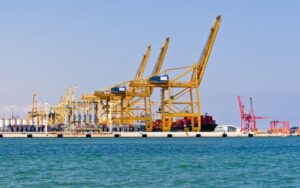Political Strife & Maritime Sector Development
Oil exports ,predominantly from Iraq’s ports, is its economic lifeline and the main contributor to GDP. Even in times of political strife Iraq has remained focused on maritime sector development .The state owned General Company for Ports Of Iraq was established in 1919 and consistently undertakes port development and expansion projects to strengthen its maritime sector. The waterfront in Iraq is limited between the national boundary of Iran and Kuwait . Iraq’s coastline is at about 48 km. There are 5 major cargo ports in Iraq such as UQP, KZP, Al Maqil Port, Abu Flus Port, and Al Faw Port located along Khor Al Zubayr channel or the Shatt Al Arab channel in the southern part of Basra Province. Apart from these cargo ports two oil terminals exclusively export crude oil namely Al Bakr and Al Amaya and are located in the Arab Bay of the Gulf.
 Credit : The Maritime Executive
Credit : The Maritime Executive
The Umm Qasr Port comprising 3 port zones is Iraq’s only deep-water port of the country handling the major component of export originating from the oilfields of South Iraq . At the South Umm Qasr Port an electronic gate managed mechanism is operated from the control room for calling and stevedoring the ships which leads to faster loading and unloading of cargoes.
Al Faw Port to become Middle East’s largest Container Port
Al Faw Port constructed on the Persian Gulf coast of Iraq is likely to become operational in 2025. The first phase of the project is nearing completion and the EPC Contractor is a South Korean company Daewoo. With planned 90 berths, the port is poised to become the Middle East’s largest container port replete with industrial zones and facilities. Spanning a breath of over 16 sqm Al Faw Port is projected to have an annual capacity of handling 99 million tons . At present Phase 1 of the ambitious port project is inching towards completion with the tentative completion date set for 2025 including a 5 berth container terminal with an initial capacity of 3.5 million teu per annum. Iraq has limited access to the Persian Gulf with about 48 km of coastline and only 2 channels deep enough for large ships to transit. The coastline of Iraq is around 1.5 % of its overall boundary. The main waterways of Iraq are Tigris and Euphrates Rivers ,whose confluence is in the south at the Shatt Al-Arab where they flow into the Persian Gulf. The existing Iraqi ports of Umm Qasr and Basra do not have the draft to handle large container vessels as the maximum draft at Umm Qasr is 11 m and Basra at 8.8 m. The Port of Basra or Al-Maqal Port draught capacity has been reduced to 5 meters as the Shatt al Arab river shore hasn’t been dredged for 3 decades .
 Credit : Iraqi News Agency
Credit : Iraqi News Agency
Iraq Turkey Logistic Corridor
The Al Faw Port will be connected to Turkey through a 1200 km long road and railway network constructed within the scope of the ‘Development Road’ project. The port would be situated at the mouth of the Shatt Al Arab River and the third phase of the Al Faw expansion project involves construction of a subsea tunnel and road links to Basra. It is expected that the sea tunnel would be completed in four years. The project, to be implemented at a cost of around 17 b US dollars, aims to establish a transportation route from Asia to Europe offering a shorter transportation time than the Suez Canal. In the long run the port of Jebel Ali may be impacted in terms of bulk and container trade. After the construction of Al Faw Port, China exported $ 53 b worth of oil from Iraq in 2022 which is a 43 % increase over the previous year.
US Counters China Silk & Belt Road Initiative
Gulf countries including Iraq have the opportunity to strengthen China’s Belt and Road Initiative which the US monitors. In order to contain China’s Belt and Road Initiative the US is supporting the India-Middle East-Europe Economic Corridor (IMEC) launched with fanfare at the G20 Summit in India and is a substantial move to counter China’s egress into the Arab world. IMEC represents an alternative trade route that competes with the Development Road to Europe via Iraq and Turkey. Iraq dosent have any seaport in the Caspian region unlike Iran whereas Iran only oceanic port is Chahbahar
US EU BRI Rail versus Sea Transport
The development of continental routes for the delivery of goods between the EU and China necessitates rail infrastructure improvement to increase the capacity of transport corridors (debottlenecking) and China’s border crossing capacity. The smooth flow of continental cargo transportation warrants improved regulation and control, simplification of customs procedures such as single consignment note, transfer of responsibility for multimodal transportation, creating digital transport corridors and harmonization of documentary support for cargo. China ratified the UN Customs Convention on the International Carriage of Goods Using a TIR Carnet (TIR Convention) in the year 2016 which is the global standard for international freight customs transit. This led to harmonization of rules for the transportation of goods in trucks and made it possible to organize full-fledged China to EU and again back to China truck transportation
BRI and Rail Freight
Rail freight between China and Europe is presently more reliable, faster , greener and more cost-effective than transportation through sea with the cost of shipping a 40-foot container by train from the Chinese mainland to Poland being less than half the cost of shipping. A freight train takes about 9 days to reach the destination compared with 35 to 40 days by sea. Exacerbating cargo and container freight costs is the ongoing conflict in the Red Sea region causing almost a 67 % decline in shipping between China and Europe via the Suez Canal consequently sea freight bulk cargo and container rates are higher than rail freight rates. Presently the cost of shipping a forty-foot equivalent unit (FEU/TEU) from Shanghai port to to Rotterdam port has peaked at $7,961 whereas the average rail freight rate remains consistent at around $3,240 per FEU/TEU according to the Eurasian Rail Alliance Index.The downside of rail transport is limited capacity when compared with shipping as on average an average freight train from China to Europe typically carries about 150 twenty-foot equivalent unit (TEU) containers per trip which pale into comparison with container ships transporting upto 24,000 TEUs (equivalent to 160 trains ). Despite this in the last 8 months the volume of rail freight between China and Europe was 14,689 round trips transporting 1.57 million TEU of goods (50 trains operating daily) connecting 224 cities across 25 European countries and more than 100 cities in 11 Asian countries. In the year 2023 trade between China and the European Union reached €739 billion for imports and exports accounting for 15 % of total EU trade (17 % for US). Notably a decade ago the more developed coastal areas of China dominated international and regional trade on account of easy access to seaports however, with the establishment of the Eurasian railway bridge the less economically developed inland provinces of China are witnessing a substantial surge of development converting into vital logistics , trading hubs and strong manufacturing bases. The Belt and Road Initiative launched in 2013 is credited the massive increase in rail freight across the Eurasian continent.
 Credit : Marine Insight
Credit : Marine Insight
Kuwait & Iraq Port Development Race
Central to the Al Faw Port concept is the Khor Abdullah waterway that leads in from the Persian Gulf being almost 10 km wide and the only access to the sea for Iraq’s commercial port of Umm Qasr whereas Kuwait has nearly 500 km of coastline and 9 islands. Iraq and Kuwait share the Khor Abdullah equally, with the border demarcated in the middle, but the navigable portion of the channel is closer to the Kuwaiti side. In the year 2011 Kuwait broke ground on the $1.6 b Mubarak Al-Kabeer port on Bubiyan Island expected to be completed by March 2016 with the port situated less than 1.6 km across the narrow channel from the site where Iraq intends to establish its port. Iraq’s other navigational channel to the Persian Gulf, the Shatt al-Arab, is located along its border with Iran and hosts two of Iraq’s land-based oil export terminals. Iraq is alarmed that the early development of Kuwait’s Mubarak al-Kabeer Port would undermine its maritime traffic and geostrategic significance.
Co- Authored by Nadir Mumtaz and Razeen Ahmed
Credit; Sources
https://worldview.stratfor.com/article/port-infrastructure-persian-gulf
https://1001iraqithoughts.com/2024/03/08/the-faw-grand-port-and-regional-implications/
https://www.seatrade-maritime.com/ports/al-faw-grand-port-inching-completion-iraq
https://www.marineinsight.com/maritime-law/5-major-ports-in-iraq/
https://openjicareport.jica.go.jp/pdf/12091625.pdf
https://www.chinadaily.com.cn/a/202412/02/WS674cfb4fa310f1265a1d0753.html

Leave A Comment